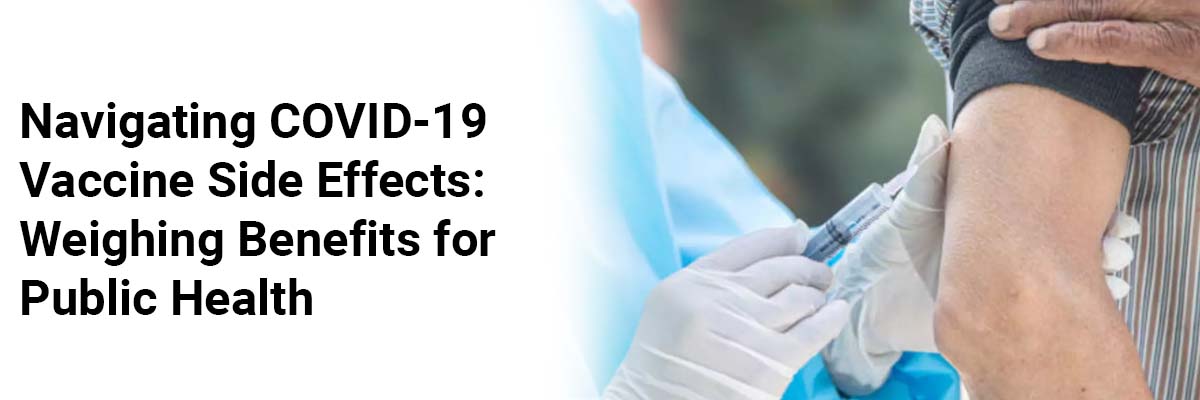

Navigating COVID-19 Vaccine Side Effects: Weighing Benefits for Public Health
With the world grappling with the devastating impacts of the COVID-19 pandemic, the news that AstraZeneca has openly acknowledged the rare side effects of its vaccine can be both shocking and reassuring. While the revelation may spark concerns among the public, it also signifies a commendable level of transparency and accountability on the part of the pharmaceutical giant
In the midst of the global battle against the COVID-19 pandemic, vaccines have emerged as a beacon of hope, offering a pathway out of the crisis that has gripped the world for over two years. However, along with this ray of hope comes a spectrum of concerns and questions surrounding vaccine side effects. As we navigate the complexities of vaccination and public health, it's essential to explore both the promises and challenges presented by COVID-19 vaccines.
Recently, it has been highlighted that the AstraZeneca COVID-19 vaccine, sold under the name of "Covishield" in India, has been associated with a rare side effect known as Thrombosis with Thrombocytopenia Syndrome (TTS). In 2021, during the initial year of COVID-19 vaccination, the Government committee on Adverse Events Following Immunisation (AEFI) reviewed a minimum of 36 cases of Thrombosis with Thrombocytopenia Syndrome (TTS) and validated 18 fatalities attributed to it.
Occurrence and Prevalence of TTS
Thrombosis with Thrombocytopenia Syndrome (TTS) was initially reported by European countries early in the pandemic, leading to the banning of the drug in several countries; however, its occurrence in India remained extremely rare. According to the data, the best estimate of the risk of VITT/TTS following the administration of the first dose of the AstraZeneca/COVISHIELD vaccine stands at approximately 1 case per 50,000 doses. The incidence of TTS after the second dose of the AstraZeneca/COVISHIELD vaccine seems to be lower than that after the initial dose; however, it has shown an increase over time. Current estimates suggest a rate of around 1 case per 600,000 doses.
Understanding the Risk
Though no medical condition or non-clinical parameters can contribute to TTS, young individuals face a heightened risk of TTS, with young women frequently encountering a more severe manifestation of the condition.
It is crucial to understand that the risk of Thrombosis with Thrombocytopenia Syndrome (TTS) is infrequent and highest within the first few weeks after the initial vaccination dose. With the majority of the populace having already received three doses and considerable time elapsed since then, the risk diminishes significantly.
Knowing Thrombosis with Thrombocytopenia Syndrome (TTS)
Thrombosis with Thrombocytopenia Syndrome (TTS), also termed vaccine-induced immune thrombotic thrombocytopenia (VITT), is a rare but severe condition characterized by blood clots forming in unusual locations, such as the brain, abdomen, or legs, along with low levels of platelets in the blood (thrombocytopenia). Symptoms indicative of Thrombosis with Thrombocytopenia Syndrome (TTS) include:
Impacting Brain
- Severe and persistent headache
- Vision impairment
- Speech difficulties
- Fatigue
- Seizures or cognitive disorientation
Impacting other body parts
- Breathing difficulties
- Chest discomfort
- Swelling in the legs
- Persistent abdominal pain
- Petechiae (small red or purple spots on the skin)
The symptoms of TTS typically occur within 4 to 28 days after receiving the vaccine. Individuals who experience symptoms consistent with TTS after receiving a COVID-19 vaccine are advised to seek medical attention promptly.
Assessment and Clinical Care Pathway
Like other clinical conditions, early detection is crucial. Utilizing diagnostic modalities such as blood tests and CT scans can aid in detection. However, this can be challenging, especially in centers with limited prior experience and resources.
The treatment requires a specialized therapeutic approach due to its distinctive characteristics from conventional blood clotting disorders. Continuous monitoring of patients and prompt intervention, whether surgical or conservative, are imperative to enhance patient survival rates. The treatment regimen for TTS encompasses several modalities:
- Administration of anticoagulant medications, excluding heparin, to prevent clot formation.
- Intravenous immunoglobulin (IVIG) therapy - infusion of a blood-derived product containing antibodies to stabilize and improve the patient's condition.
- Prescribing high-dose prednisone, a form of steroid medication, to alleviate symptoms and mitigate the inflammatory response.
Future Outlook
While vaccine side effects have raised concerns and prompted vigilance, they must be viewed within the broader context of the remarkable achievements vaccines have brought forth. Simultaneously, continued monitoring, research, and collaboration with regulatory agencies must be carried out to mitigate risks and address any concerns that may arise. Formulating strategies to enhance vaccine safety and efficacy can pave the way for improved formulations and novel approaches to combat the virus.
By remaining steadfast in our commitment to vaccination, coupled with proactive measures to mitigate risks and address concerns, we can navigate the road ahead with resilience and determination, ultimately emerging stronger in our fight against COVID-19.
References:
- Jain N, Chaudhary P, Shrivastava A, Kaur T, Kaur S, Brar HS, Jindal R. Thrombosis with Thrombocytopenia Syndrome (TTS) After ChAdOx1 nCoV-19 Immunization: An Investigative Case Report. Am J Case Rep. 2023 Mar 18;24:e938878. doi: 10.12659/AJCR.938878. PMID: 36932639; PMCID: PMC10037117.
- https://timesofindia.indiatimes.com/life-style/health-fitness/health-news/astrazeneca-admits-its-covid-vaccine-can-cause-rare-side-effect/articleshow/109710995.cms
- Thrombosis with Thrombocytopenia Syndrome (TTS) [Internet]. Healthdirect Australia. Available from: https://www.healthdirect.gov.au/thrombosis-with-thrombocytopenia-syndrome-tts#:~:text=Treatment%20for%20TTS%20included%3A,a%20type%20of%20steroid%20medicine.
- COVID-19 Vaccinations [Internet]. British Columbia Centre for Disease Control. Available from: http://www.bccdc.ca/health-professionals/clinical-resources/covid-19-care/covid-19-vaccinations/thrombosis-with-thrombocytopenia-syndrome.
https://indianexpress.com/article/health-wellness/astrazeneca-vaccine-clotting-covishield-vaccine-india-9299683/

